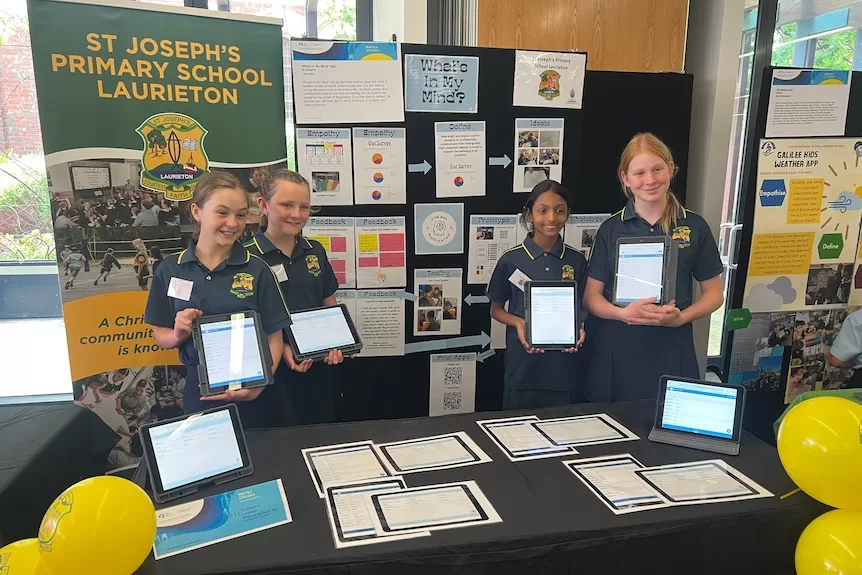As the distinctive buzz of a drone fills the air, science teacher Alfina Jackson guides two girls through the programming steps needed to fly and land the device.
Her enthusiasm engages her primary school students and she hopes to inspire more girls to become involved in science, technology, engineering and maths (STEM) fields.
“I love the opportunities technology provides, and I think in terms of being future-focused in education, it’s being able to understand that this is where we are going,” she said.
“Whether it’s medicine, whether it’s farming, there is technology in everything we do, and it is about using it effectively to improve your life and solve problems.”
Ms Jackson said her love of technology was nurtured by an inspiring information and process technology (IPT) teacher during her high school years in Sydney.
Now, she’s working to encourage students to explore science and technology fields, where women are still under-represented.
The Commonwealth’s STEM Equity Monitor is a national data resource on girls and women in STEM.
Its data shows the proportion of women in STEM-qualified occupations in Australia was 15 per cent in 2022, up from 10 per cent in 2002.
Ms Jackson is the digital technologies coordinator and STEM teacher at two Catholic primary schools on the New South Wales Mid North Coast.
As technological advances create new careers, she wants to ensure her students at St Joseph’s Laurieton and Wauchope primary schools are ready and to spark their interest in science and technology.
“It’s so good to see girls getting excited about STEM,” Ms Jackson said.
“It’s about finding your passion and understanding computer science can be embedded in your passion.”
St Joseph’s Laurieton school captain Leah Hayward said Ms Jackson had inspired her to keep pursuing science and technology projects.
“I really enjoy being able to learn from experiences I have been able to do … it’s encouraged me very much,” Leah said.
Educator of the year
Ms Jackson’s passion for “enhancing education through technology” saw her recently named the Information and Communication Technologies NSW Educator of the Year.
The award aims to recognise leaders and innovators in the field and is managed by ICT Educators of NSW, a non-profit professional teaching association for the state’s ICT, STEM and computer science educators.
Ms Jackson, who has presented at teaching conferences in recent years, said she hoped it would help her reach more schools.
“I’m very excited for the opportunity the award brings … I am looking at helping schools outside my system develop digital literacy tools.”
Inspiring women to pursue STEM careers
Queensland University of Technology (QUT) industrial design lecturer Marianella Chamorro-Koc said Ms Jackson’s achievement was “very encouraging” and would hopefully inspire more female students to pursue science and technology careers.
“It’s important to show females at different stages of their academic career, that there are pathways for them to apply their interest, to apply their passion, for developing different solutions,” she said.
Dr Chamorro-Koc, who has co-created a pain metric device for paediatric care, said different perspectives were crucial to innovation and success.
“The female perspective on the use of technology, and its shortcomings, and flaws of current products and systems, is important,” she said.
“My area is industrial design … we can see the majority of the cohort is male dominated, it’s easy to observe, so most of the projects and the solutions have that male perspective, with less attention to the human qualities in the different projects.
“The female perspective really brings diversity … into the ways methodologies are developed.”
Technology in classrooms
At the primary school level, one of Ms Jackson’s main aims is encouraging independent digital literacy.
One initiative has been building websites with personalised links for students, allowing them access to child-friendly sources for research.
“My work in flipped learning has seen me on a journey of using video to support field knowledge of students and teaching retrieval of information,” she said.
“I also embed how-to videos within slides templates so that students have instructions from me at their fingertips.”
Ms Jackson said she also looked at real-world applications of technology.
“This year, stage three has been exploring future farming and how drones support farming and will design their own monitoring system.”
Find more local news
Browse for your location and find more local ABC News and information
